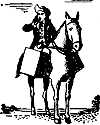 Terry travelled around the country on horseback until he found a
customer and even then he had to sell his goods on the installment
plan, by taking hand-woven cloth, meat or any other salable commodity
as part payment.
Terry travelled around the country on horseback until he found a
customer and even then he had to sell his goods on the installment
plan, by taking hand-woven cloth, meat or any other salable commodity
as part payment.Although he sold a good many clocks this way he realized the barrier to his business was the high price. People wanted timepieces but most of them didn't have that much either in money or equivalent commodities. Terry knew that Eli Whitney was making guns by a new system so he went over to see him at his factory only 30 miles away. Terry said to himself, "If Whitney can reduce the price and improve the quality of guns, why can't I do the same thing with clocks?" In 1807 Terry began to install the Whitney system in his factory. Special tools were made for each part so that hundreds of exact duplicates could be made and any set of pieces, when put together, would make a perfect instrument. 5,000 clocks were made in three years, the price came down and sales were made in thousands of American homes. |








